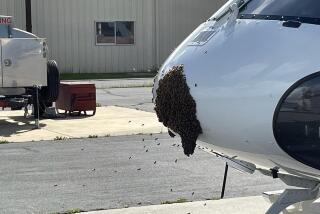Bumblebee skilled at ‘buzz pollination’ may soon join the endangered species list
A type of bumblebee native to North America may soon be named to the endangered species list. It would be the first bee species to be considered endangered in the United States.
The U.S. Fish and Wildlife Service on Thursday formally proposed that the Bombus affinis, or rusty patched bumblebee, be listed as endangered under the guidelines of the Endangered Species Act.
“As pollinators, rusty patched bumblebees contribute to our food security and the healthy functioning of our ecosystems,” the Fish and Wildlife Service said in a statement. The federal agency estimates that native insect species, particularly bees, contribute $3 billion in economic value annually in the United States. Because of a specialized pollen-shedding movement called “buzz pollination,” bumblebee species are better at pollinating some crops than honeybees.
The Xerces Society for Invertebrate Conservation filed a formal petition in 2013 seeking to place the rusty patched bumblebee on the endangered list. According to the conservation organization, the species’ population has declined 87% in recent years.
Another Xerces Society petition on Change.org has garnered more than 128,000 signatures this year alone.
Rusty patched bumblebees contribute to our food security and the healthy functioning of our ecosystems.
— U.S. Fish and Wildlife Service
The bees’ decline can be attributed to habitat loss, climate change, disease, farming and pesticides, according to the Fish and Wildlife Service.
The rusty patched bumblebee — so named for a distinctive colored patch on the abdomens of worker bees — is particularly apt at pollinating cranberries, plums, alfalfa, onion seed and apples. Its life cycle begins earlier in spring and extends later into the fall than most other types of bumblebees.
The species used to be found across at least 26 states in the Midwest and Northeast; in recent years, sightings have shrunk to just a few states, the Xerces Society reported.
Per the rules of the Endangered Species Act, the next step is a 60-day period in which members of the public, scientists and government agencies can submit expert opinions and other input. Comments may be submitted online until Nov. 21.
After that, the Fish and Wildlife Service will announce its decision.
Follow me on Twitter @jessica_roy and “like” Los Angeles Times Science & Health on Facebook.
MORE IN SCIENCE
MacArthur winner Victoria Orphan showed how deep-sea microbes keep greenhouse gas out of atmosphere
Manu Prakash, newly minted MacArthur ‘genius,’ builds water computers and origami microscopes







